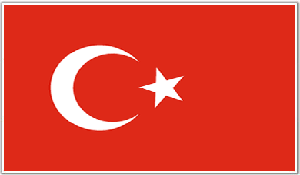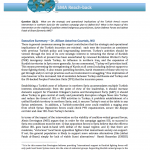Turkish Army Syrian Intervention

Question (QL2): What are the strategic and operational implications of the Turkish Army’s recent intervention in northern Syria for the coalition campaign plan to defeat ISIL? What is the impact of this intervention on the viability of coalition vetted indigenous ground forces, Syrian Defense Forces and Jabhat Fatah al-Sham (formerly ANF)?
Author | Editor: Astorino-Coutois, A. (NSI, Inc).
There is general consensus among the expert contributors that the strategic and operational implications of the Turkish incursion are minimal: each sees the incursion as consistent with previous Turkish policy and long-standing interests. Turkey’s activities should be viewed through the lens of its core strategic interest in removing the threat of Kurdish separatism, which at present has been exacerbated by renewed Kurdistan Worker’s Party (PKK) insurgency inside Turkey, its influence in northern Iraq, and the expansion of Kurdish territories in Syria more generally. As one commented, Turkey will prioritize itself. This means preventing the strengthening of Kurds at all costs (including indirect support to those fighting them). It also means patrolling borders, harsh treatment of those who try to get through and/or corrupt practices such as involvement in smuggling. One implication of note however is the increased risk of escalation between Turkey and Russia and Turkey and the US-backed Peoples Protection Units (YPG) that the incursion poses.
Establishing a Turkish zone of influence in northern Syria accommodates multiple Turkish interests simultaneously: from the point of view of the leadership, it should increase domestic support for President Erdogan’s Justice and Development Party (AKP); it should allow Turkey to gain control of costly and potentially disruptive refugee flows into Turkey and reduce the threat of ISIL or PKK activities in Turkey; it prohibits establishment of a unified Kurdish territory in northern Syria; and, it secures Turkey’s seat at the table in any Syrian settlement. In addition, a Turkish-controlled zone could establish a staging area from which Syrian Opposition forces could check PYD expansionism, secure the Aleppo corridor and clear ISIL from Turkey’s borders.
In terms of the impact of the intervention on the viability of coalition-vetted ground forces, Alexis Everington (MSI) argues that in order for the campaign against ISIL to succeed in Syria two conditions must be met: 1) that opposition forces in Syria believe that the effort to defeat ISIL goes hand-in-hand with defeat of the Assad regime; and 2) that there are moderate, “victorious” local Sunni opposition fighters that mainstream society can support. If not, the general population is likely to support more extreme alternatives (like Jabhat Fatah al-Sham) simply for lack of viable Sunni alternatives.1 Hamit Bozarslan (EHESS) suggests that unfortunately the ship may have sailed on this condition. He argues that the Free Syrian Army of today, that Turkey backs, has little resemblance to the Free Syrian Army of 2011: many of its components hate the US, are close to radical jihadis and most importantly, in his view are a very weak fighting force. He explains that they succeeded recently in Jarablus because ISIL did not fight (organizing a suicide-attack and destroying four Turkish tanks, simply showed that ISIL could retaliate).
Finally, Bernard Carreau (NDU) argues that “the U.S. should welcome the Turkish incursion into northern Syria and could do so most effectively by reducing its support of the SDF and YPG.” Doing so he believes could make Turkey “the most valuable U.S. ally in Syria and Iraq.” Additionally, the experts suggest that it is important to remember that the Turkish leadership has seen and will continue to see the fight against ISIL through the lens of its impact on Kurdish separatism and terrorism inside Turkey including Kurdish consolidation of power along the Syrian border. The impact on Opposition forces depends on the degree to which they see that the Turkish moves, as well as the campaign against ISIL address their objective of toppling the Assad regime.
Contributing Authors
Natali, D. (National Defense University), Cagaptay, S. (Washington Institute for Near East Policy), Everington, A. (Madison-Springfield, Inc.), Carreau, B. (National Defense University),Bozarslan, H.(Ecole des Hautes Estudes en Sciences Sociales), Aguero, S. (US Army), Hoffman, M. (Center for American Progress), Sayigh, Y. (Carnegie Middle East Center)

Comments